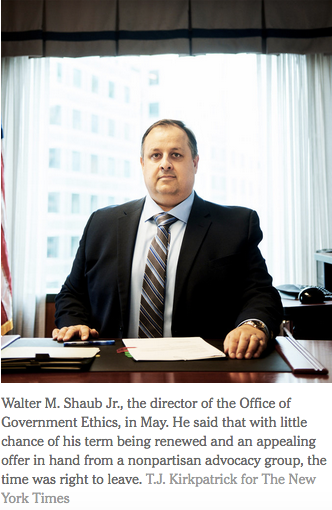It is the job of the ethics office, a creation of a post-Watergate Congress, to work with a web of ethics officials at each agency to help people entering the government sidestep potential conflicts. The office guides each administration’s political appointees through financial disclosure requirements and creates agreements to restrict participation in deliberations over topics they handled for paying clients.
Mr. Shaub, 46, had faced an uncertain future at the agency since Mr. Trump took office in January. In the weeks between the president’s unexpected election victory and his inauguration, Mr. Shaub took an extraordinary gamble: He recommended very publicly on Twitter, and in a rare public speech, that Mr. Trump liquidate his vast business and personal holdings. This arrangement, Mr. Shaub argued, was the only truly ethical option.
Mr. Trump did not heed his advice, and by the middle of January, Mr. Shaub thought he might be fired. To minimize his attachment to the position, he packed up the personal possessions that filled his office.
But he was not fired, even as he continued to spar with Mr. Trump’s aides over a range of ethical concerns, including the ethics office’s authority to exercise oversight of the White House.
A High Bar for the Next Ethics Chief
The 70-person O.G.E. works with some 4,500 executive branch ethics officials whose goal is preventing conflicts of interest among 2.5 million civilian federal employees. The energy, commitment and character of the person at the top is crucial to the office’s success, not least because it has no real enforcement power. Its influence derives from a mix of financial disclosure rules, public pressure and, ideally, White House support for its mission of ensuring that civil servants act on the behalf of Americans, not themselves.
The office has had no such backing in its grinding battles with the Trump administration, whose appointees, some of the wealthiest nominees in history, resisted demands that they sell off businesses and assets that presented potential conflicts of interest. After a long confrontation, Mr. Shaub won one battle, forcing the administration to disclose the names of officials in Mr. Trump’s inner circle who had been granted waivers from the White House’s pledge to avoid conflicts of interest. It was a hollow victory, since all those officials were allowed to go about their business as usual.




